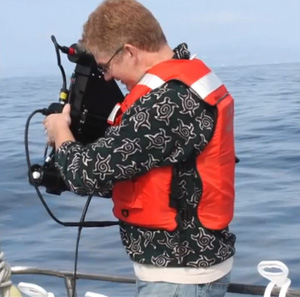Campus News
Coastal ecosystems research project wins NASA Honor Award
The Coastal and Ocean Airborne Sensor Testbed project, involving UCSC and NASA scientists, has received a NASA Honor Award.

The Coastal and Ocean Airborne Sensor Testbed (COAST) project, involving faculty and students at UC Santa Cruz and scientists at NASA Ames Research Center, has received a NASA Honor Award.
COAST is a NASA Earth-science flight project that provides a unique suite of instruments designed to obtain ocean, coastal, and atmospheric data simultaneously. This information can then be used to study environmental changes in a given coastal area as well as validate satellite observations of the same area.
Raphael Kudela, professor of ocean sciences at UCSC, and scientists with the University Affiliated Research Center (UARC) played key roles in the COAST mission. Flight tests with the instrument suite on a small aircraft were carried out over Monterey Bay in October 2011. Sailing on the research vessel John Martin, UCSC and UARC researchers gathered data directly from the ocean underneath the aircraft’s flight path to validate the measurements.
“We were out on the boat with a whole bunch of radiometers and other light-measuring instruments and taking light measurements below the water and right above the water,” Kudela said. “It was important to get good measurements of all the variability so that when you go back to the airplane data and [see a] sharp feature, you want to make sure that’s actually real.”
The COAST instrument suite combines a customized imaging spectrometer, sun-photometer system, and new bio-optical radiometer instruments to obtain a variety of data simultaneously. The imaging spectrometer is optimized in the blue region of the spectrum to emphasize remote sensing of marine and freshwater ecosystems. Ultimately, NASA’s goal is to study coastal ecosystems on a global scale.
“This gives us the opportunity to study everything from the same platform at once,” Kudela said. “Now that we’ve done it and everyone has seen what we can do, people are really excited about the potential for this in terms of science.”